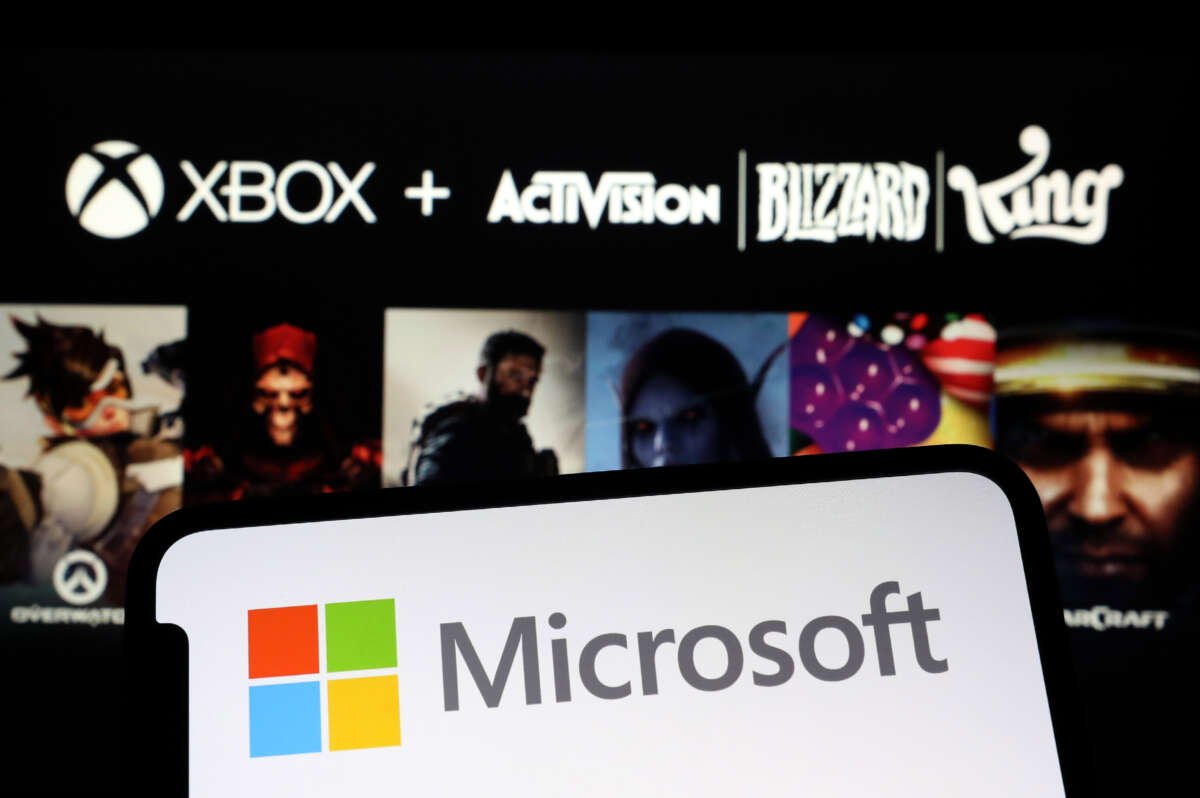Support justice-driven, accurate and transparent news — make a quick donation to Truthout today!
In one of the most aggressive antitrust moves taken against Big Tech in recent history, the Federal Trade Commission (FTC) announced on Thursday that it is moving to block Microsoft’s $69 billion acquisition of video games company Activision Blizzard.
The agency is suing over concerns that the acquisition would give Microsoft, which makes game console Xbox, too much power over the gaming industry and is “reasonably likely to substantially lessen competition or tend to create a monopoly in multiple markets,” the agency wrote in its complaint. The FTC points out that the $1.8 trillion company, which has had multiple major tech acquisitions approved by regulators over the past decade, has a history of acquiring gaming companies and using their ownership to suppress competition.
Activision Blizzard is one of the gaming industry’s largest developers. It is behind best-selling game franchises like Call of Duty, World of Warcraft, Overwatch, and Candy Crush, and the company says it has nearly 370 million active users monthly.
“Activision currently has a strategy of offering its games on many devices regardless of producer. But that could change if the deal is allowed to proceed,” the FTC wrote in a press release.
“With control over Activision’s blockbuster franchises, Microsoft would have both the means and motive to harm competition by manipulating Activision’s pricing, degrading Activision’s game quality or player experience on rival consoles and gaming services, changing the terms and timing of access to Activision’s content, or withholding content from competitors entirely, resulting in harm to consumers,” the release continued.
If the acquisition were to go through, it would be the largest consumer technology purchase in two decades — worth more than Elon Musk’s $44 billion purchase of Twitter — and would be the largest acquisition in Microsoft’s and in video game history, according to the FTC’s complaint.
Microsoft intends on fighting against the FTC’s decision in court, and Microsoft’s vice chair and president Brad Smith said in a statement that the company believes the acquisition “will expand competition” in the industry.
The acquisition has been under scrutiny from European regulators, who are also concerned about the potential for the deal to reduce competition in the gaming industry. The EU opened an investigation into the merger last month, saying that Microsoft “may foreclose access” to Activision Blizzard’s games with its acquisition.
The FTC suit is one of agency chair Lina Khan’s biggest antitrust moves yet. Khan, who was nominated to lead the FTC by President Joe Biden last year, was a champion of the antitrust movement before her nomination and had a major hand in shaping current views of antitrust laws.
Her nomination was supposed to portend a new era of enforcement for antitrust regulations, but her first year as chair hasn’t been quite as bold as antitrust advocates and the business community had expected when she was picked. With a new Democratic majority in the five-member commission, however, Khan may now be empowered to take more decisive action — like taking on Microsoft.
A terrifying moment. We appeal for your support.
In the last weeks, we have witnessed an authoritarian assault on communities in Minnesota and across the nation.
The need for truthful, grassroots reporting is urgent at this cataclysmic historical moment. Yet, Trump-aligned billionaires and other allies have taken over many legacy media outlets — the culmination of a decades-long campaign to place control of the narrative into the hands of the political right.
We refuse to let Trump’s blatant propaganda machine go unchecked. Untethered to corporate ownership or advertisers, Truthout remains fearless in our reporting and our determination to use journalism as a tool for justice.
But we need your help just to fund our basic expenses. Over 80 percent of Truthout’s funding comes from small individual donations from our community of readers, and over a third of our total budget is supported by recurring monthly donors.
Truthout has launched a fundraiser to add 379 new monthly donors in the next 6 days. Whether you can make a small monthly donation or a larger one-time gift, Truthout only works with your support.
